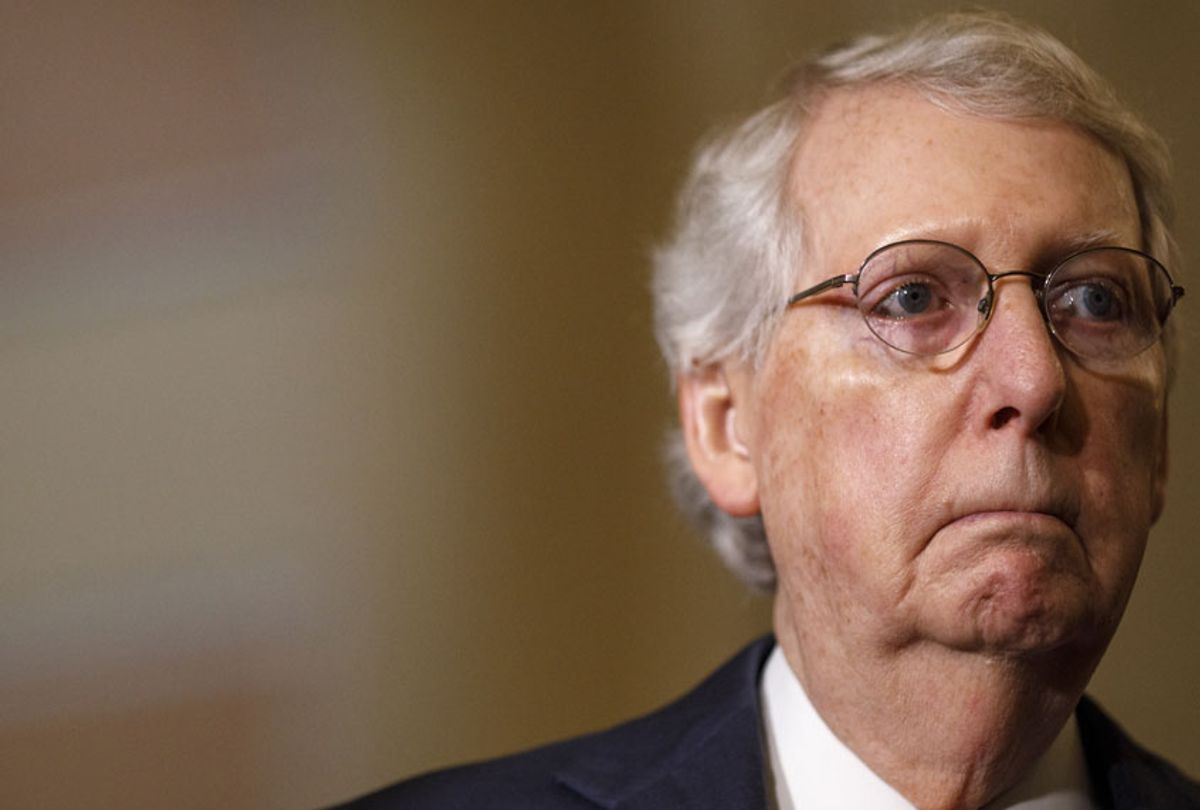Senate Majority Leader Mitch McConnell issued a warning against killing the legislative filibuster, as a growing number of Democrats on the 2020 campaign trail and on Capitol Hill have signaled they would be willing to eliminating the 60-vote threshold if they seize control of the upper chamber in 2020.
"The legislative filibuster is directly downstream from our founding tradition. If that tradition frustrates the whims of those on the far left, it is their half-baked proposals and not the centuries-old wisdom that need retooling," McConnell wrote in an op-ed for The New York Times.
The Kentucky Republican argued "strong minority rights have always been the Senate's distinguishing feature," and noted that when Democrats controlled the upper chamber, with Sen. Harry Reid of Nevada as their leader, they employed the so-called "nuclear option" in 2013 to advance lower court and executive branch nominees. McConnell slammed the move as a "power grab."
Under the change, the Senate can limit debate time on executive and judicial branch nominees with a simple 51-vote majority rather than clearing a 60-vote threshold.
In his op-ed, McConnell then quoted the warning he issued to Senate Democrats in 2013, before they took up the rules change: "You'll regret this, and you may regret this a lot sooner than you think."
After the 2016 election, Republicans stayed in control of the Senate, Donald Trump won the White House — and McConnell offered full-throated support for the rules change he had once denounced.
He detonated the nuclear option in 2017 to install Neil Gorsuch to the Supreme Court — a move that came after Democrats blocked the nomination under the previous 60-vote filibuster threshold. The tactic allowed Senate Republicans to bypass the Democrats' blockade and confirm Gorsuch with a simple 51-vote majority, largely along party lines.
Republicans, at the time, justified their decision to take up the rules change they had previously decried by blaming the Democrats.
"Harry Reid decided that executive nominations will be done by simple majority, and we just simply went with the Harry Reid rule today," Sen. Rand Paul, R-Ky., said at the time. "I don't think this is any different."
At the same hearing, Sen. John Cornyn, R-Texas, declared: "Our Democratic friends started down this path."
Some Senate Democrats, on the other hand, appeared to regret voting with their party for the nuclear option in 2013. Sen. Chris Coons, D-Del., stated: "I anticipate that many of my colleagues will come to regret the decisions and actions taken today and tomorrow in this Congress and in Congresses ahead."
Senate Republicans went nuclear again in 2019 to speed up the confirmation of hundreds of district judges and most executive nominations.
McConnell defended the move at the time by arguing Democrats would also benefit from the rules change, too, as he warned the status quo would "virtually guarantee that any future Democrat administration is subject to the same paralysis."
McConnell and Trump have made confirming judges one of their signature achievements as they seek reelection next year.
"So, this is the legacy of the procedural avalanche Democrats set off," McConnell wrote in The Times, predicting the "consequences of taking Sen. Reid's advice will haunt liberals for decades."
His defense of the legislative filibuster came as lawmakers are in the middle of a long August recess.
In his op-ed, McConnell also railed against "leftward" policies supported by 2020 Democrats to underscore the need to maintain the 60-vote threshold.
"The party is rallying around the very kinds of radical schemes that the Constitution intentionally frustrates," McConnell wrote of the Democrats. "And rather than moderate or engage in persuasion, many on the left seem more tempted to rewrite the rules once again."
He stressed that Senate Republicans understand that majority control in the chamber can change with each election.
"My Republican colleagues and I have not and will not vandalize this core tradition for short-term gain," McConnell wrote. "We recognize what everyone should recognize — there are no permanent victories in politics. No Republican has any trouble imagining the laundry list of socialist policies that 51 Senate Democrats would happily inflict on Middle America in a filibuster-free Senate."
He added, "If future Democrats shortsightedly decide to reduce the Senate to majority rule, we'll have lost a key safeguard of American government."



Shares